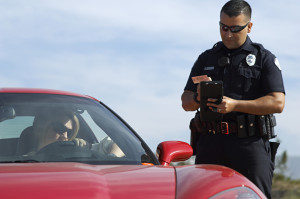 If you have ever received a traffic ticket, your first instinct may have been to fight it – after all, many people believe that the citation was unjust and that they did not deserve the harsh penalty that they received. However, roughly only 3 percent of drivers who receive traffic citations actually contest them in court, and choosing to do so relies purely on the circumstances surrounding the ticket. You’ll want to ask yourself the following questions before you consider fighting Connecticut traffic violations
If you have ever received a traffic ticket, your first instinct may have been to fight it – after all, many people believe that the citation was unjust and that they did not deserve the harsh penalty that they received. However, roughly only 3 percent of drivers who receive traffic citations actually contest them in court, and choosing to do so relies purely on the circumstances surrounding the ticket. You’ll want to ask yourself the following questions before you consider fighting Connecticut traffic violations
1. Is the cost of the ticket worth the expenses it would take to fight it?
Going to court requires taking time off of work, finding reliable transportation, and possibly hiring legal counsel to help you with your court battle. All of these costs combined may be greater than the loss you would incur by just paying the ticket.
2. Do I have the time to go through the process of fighting it?
Court cases for driving infractions typically don’t drag on for weeks or months like other cases can, but you still must be prepared to take at least one entire day off from work just in case. Taking time away from your work and personal schedules to fight a simple speeding ticket could serve as an inconvenience, especially if you have an unforgiving employer or a position that really requires you to be there on the court date.
3. Will the ticket influence my insurance rates?
If your premium increases because of the ticket you received, you may actually be saving money by fighting it in court – even with the expenses mentioned above. Check with your insurance agency to find out how certain citations affect your rates.
4. Could I lose my license if I don’t fight the ticket?
Some motorists run the risk of losing their licenses if they have tallied up multiple traffic violations. If this is the case, it provides a valid reason for you to go to court, as you don’t want to lose your mode of transportation or be forced to attend traffic school over another ticket.
5. Do I have a solid defense to successfully fight the ticket?
Without proper representation, fighting the ticket may simply be a waste of time. Review your options you may need to hire an attorney who has experience with traffic cases and can help advise you through the process as well as in court.
Defenses for Fighting Connecticut Traffic Violations:
If you are considering going to court, there are several possible defenses (if applicable) that you could use to successfully get a traffic citation overturned. For example, if you can provide proof that the view of the police officer who pulled you over was obstructed, this could warrant dismissal of the violation. If you were cited for speeding and a radar gun was used, check whether it could have been compromised by something in the surrounding area. Alternatively, you could bring up the need to keep up with the flow of traffic (if there was any at the time).
Whenever you receive a traffic ticket, make sure to get testimonials from witnesses and document everything, including the officer’s name, badge number, their temperament, and the weather conditions. Finally, take photos to document the area where you were pulled over.
In the event that you are pulled over, it is important to remember one thing. Whether you believe the traffic ticket you received is justified or not, ALWAYS cooperate with the citing officer, abide by his or her instructions and treat them with the utmost respect. Acting irrationally and unnecessarily escalating the situation could result in additional citations that will only affect you long after the officer has left.
The most common traffic citation issued by police officers on a daily basis is due to speeding. But do you know what types of driving infractions in Connecticut could cost you the most?



 The Winter winds are finally subsiding and the warm open road is waiting for you to get out and ride! But after leaving your ride in storage for the Winter, it’s important when preparing your motorcycle to check all of your safety equipment and review the laws and regulations to ensure your next road trip ends safely.
The Winter winds are finally subsiding and the warm open road is waiting for you to get out and ride! But after leaving your ride in storage for the Winter, it’s important when preparing your motorcycle to check all of your safety equipment and review the laws and regulations to ensure your next road trip ends safely. In New England, fall is in full force; the leaves have changed colors, Thanksgiving preparations have begun, and the air is slowly getting colder and colder as winter approaches. While these changes may signal the approach of the holiday season, however, the colder weather also signifies another change: the increased danger to your car or other vehicles.
In New England, fall is in full force; the leaves have changed colors, Thanksgiving preparations have begun, and the air is slowly getting colder and colder as winter approaches. While these changes may signal the approach of the holiday season, however, the colder weather also signifies another change: the increased danger to your car or other vehicles. If you have ever received a traffic ticket, your first instinct may have been to fight it – after all, many people believe that the citation was unjust and that they did not deserve the harsh penalty that they received. However, roughly only 3 percent of drivers who receive traffic citations actually contest them in court, and choosing to do so relies purely on the circumstances surrounding the ticket. You’ll want to ask yourself the following questions before you consider fighting Connecticut traffic violations
If you have ever received a traffic ticket, your first instinct may have been to fight it – after all, many people believe that the citation was unjust and that they did not deserve the harsh penalty that they received. However, roughly only 3 percent of drivers who receive traffic citations actually contest them in court, and choosing to do so relies purely on the circumstances surrounding the ticket. You’ll want to ask yourself the following questions before you consider fighting Connecticut traffic violations As winter slowly fades into spring, people are gearing up for what should be delightful weather this season in New England. It’s the type of weather that is perfect for riding a motorcycle up and down the scenic east coast. While your buddies already have theirs, you might be thinking you are overdue for buying your own motorcycle. But before you start your search to find the sweetest ride, we’ve provided a checklist of items to consider to ensure you’re ready to hit the road. Buying a motorcycle is much like buying a car, only with a few more caveats.
As winter slowly fades into spring, people are gearing up for what should be delightful weather this season in New England. It’s the type of weather that is perfect for riding a motorcycle up and down the scenic east coast. While your buddies already have theirs, you might be thinking you are overdue for buying your own motorcycle. But before you start your search to find the sweetest ride, we’ve provided a checklist of items to consider to ensure you’re ready to hit the road. Buying a motorcycle is much like buying a car, only with a few more caveats.